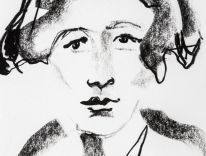I was in a funk not long ago, and a person in a funk sometimes makes bad decisions. Like the night I decided to take in Michael Moore’s Sicko to shake some of the horrible thoughts I was having. Very bad idea—like treating food poisoning by downing a milkshake. I staggered out of the theater. The film had forced me to acknowledge what I already half understood. Having lived for three years with my family in Denmark (a country with universal health care), I knew that we do not have to live in a society where the dying must worry about whether their exit will be covered by their insurance carrier.
The documentary should have given us all pause for self-examination, but that didn’t happen. The media on the left, which accept a great deal of advertising revenue from drug companies, were unusually muted about the questions raised by Moore. Those on the right, who feel nothing but disgust at the idea of government-run health care, worked to douse the discussion by trotting out one Canadian after another to complain about long lines for bypasses—as though most people here don’t have to wait, as though children haven’t died waiting for treatment in U.S. emergency rooms. I have a professor friend who is a colon-cancer survivor. She was having stomach pains the first week of August but couldn’t get an appointment to see her GI specialist until November.
A few years back, an HMO doctor gave my mother a drug that was counterindicated. It caused her hips and shoulders to fall out of their joints, and they could not be restored because of her severe osteoporosis. As a result, my mother chose to go off all life-saving medications. She died a slow death, harassed by bean counters eager to move her to a facility less expensive than the hospital.
But enough stories. We Americans are a practical, bottom-line people—and the bottom line is plain. The Census Bureau reports that we are forty-first in the world—behind Cuba and most of Europe—in infant-mortality rates. We are thirtieth in life expectancy, behind virtually every other developed nation in the world. How do our system’s defenders argue against these dire statistics? Generally, they don’t.
Discussing Moore’s film with former Arkansas Governor Mike Huckabee, Tucker Carlson of MSNBC harrumphed about the queues in Canada before mocking Moore himself: “How much does that guy weigh, anyhow?” A few days earlier, Moore was on Larry King Live. One gentleman called in to comment: “My wife and I are in our sixties. Neither one of us has health insurance. But we just can’t understand why you keep bashing America.” Sicko. On the same program, Moore maintained that universal health care should not be regarded as a leftist plot but rather as the Christian thing to do. In a poignant moment during a recent Democratic presidential debate, Steve Svarka, a sixty-year-old former steel worker who now walks with crutches, tearfully pressed the candidates, “Every day of my life, I sit at the kitchen table across from the woman who devoted thirty-six years of her life to my family, and I can’t afford to pay for her health care. What’s wrong with America?”
Though so many are suffering because of our health-care system, it is hard to imagine what it would take to regenerate our healing institutions. It finally required riots and mass demonstrations for Americans to act on the idea of equal rights, but it is not likely that the ill or the inadequately insured are going to take to the streets to demand that everyone have access to medical treatment; nor are those with good coverage likely to spend their leisure hours going door to door for universal health care. For the most part, the healthy and blissfully insured don’t want to think about revamping the system, especially when the health-care industry is willing to spend millions creating bogeys that reinforce that aversion. So what is all the huffing, puffing, and posturing about—as though we were about to perform radical surgery on our public policy? We’re not.
And yet there is still medicine to be found in the debate sparked by Sicko. In the final sequence of the film, Moore sighs, “We are a nation of me instead of we.” Like him or not, that was one point it was hard for even hidebound conservatives to snigger at. We Americans adore terms like “personal dreams” and “freedom.” Though we don’t often explore what we might mean by freedom, it seems that, for us, being free mainly amounts to having disposable income and the freedom to spend it. We don’t seem overly concerned about, say, being free from the painful idea that our brothers and sisters might be sick or have sick children they can’t afford to care for. Europeans have had plenty of chances to vote down universal health care. They don’t because they would rather do with a little less in their pockets than be haunted by the idea of their fellow citizens being sick and without access to medical care.
The doctor will tell you that it is better to know what ails you than to be in the dark, better to know ourselves than to kid ourselves. And the truth about ourselves is that whatever our other virtues, we as a people are not overly empathetic. Recently confronted with concerns about the uninsured, President George W. Bush reassured Americans that there is no need to worry. “After all,” he said, “you just go to the emergency room.” And if you survive and have a job, you can work the rest of your life to pay off the bill. What is wrong with America? Maybe it’s our heart.
In a recent Scripps Howard op-ed (July 26), Deroy Murdock of the Hoover Institute scoffed at the call for universal health care by asking: “What’s going to be next—a universal right to food and clothing?” Murdock seems to believe that the only language that can be used to argue for taking care of one another is the language of rights. But Jesus never mentioned rights when he commanded us to serve one another, and you can be sure that Murdock and his like are not going to lose a wink worrying over the plight of uninsured sick children.
Maybe Murdock’s is the logic of rugged individualism, but if so, let’s be rugged enough to acknowledge that we Americans don’t have any right to our self-image as a generous and compassionate people. Let’s be rugged enough to glean some self-knowledge from our indifference, and to admit the basic truth that as a people we have a little chill in our souls.

